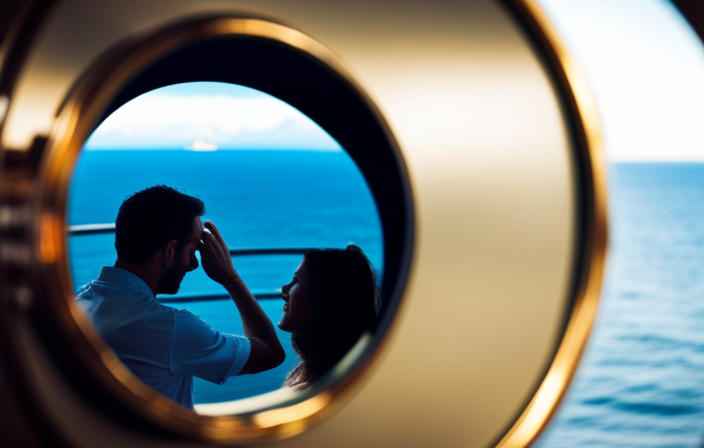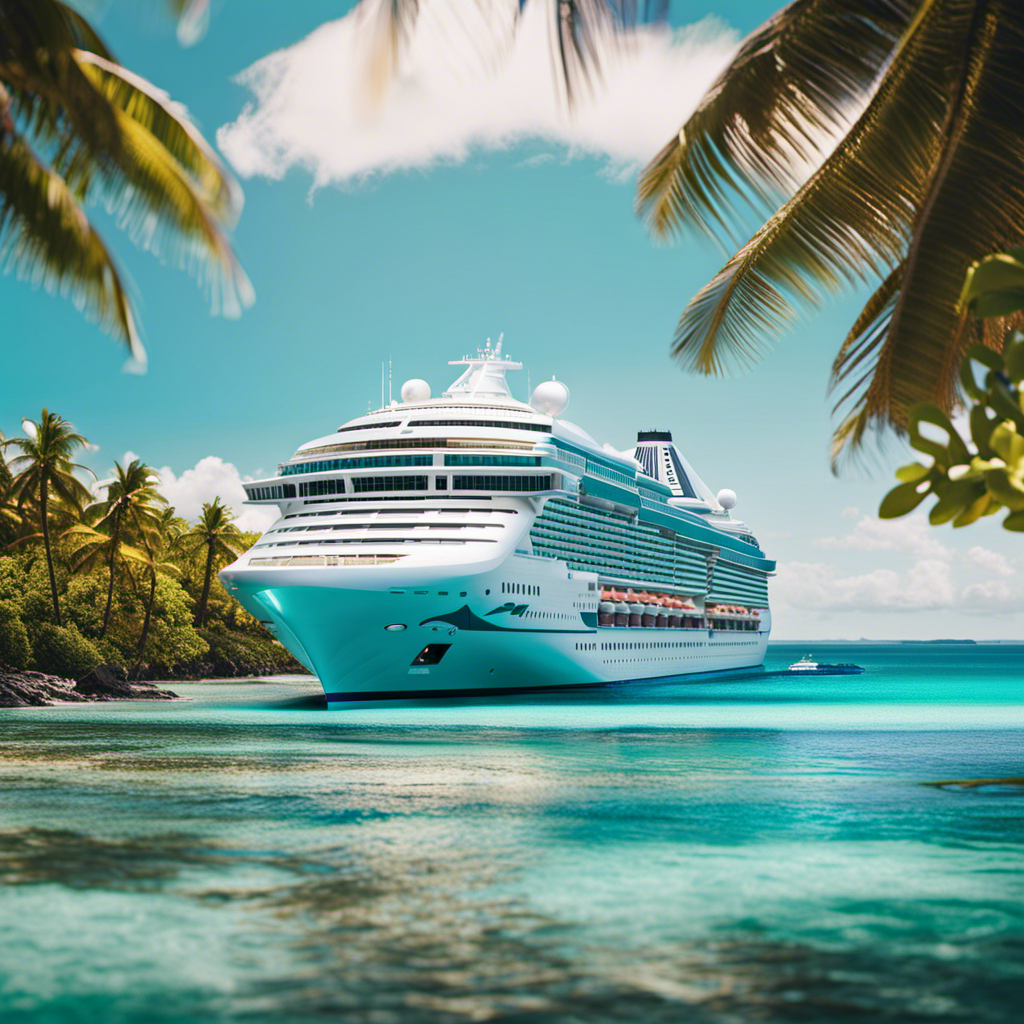Have you ever wondered why you feel dizzy after going on a cruise? Let me tell you, it’s not just a simple case of seasickness; there’s actually more to it than that.
In this article, we will delve into the fascinating world of the inner ear and balance, exploring the connection between visual cues and dizziness, and even discussing the impact of medications and pre-existing conditions on your cruise-induced dizziness.
So, sit back, relax, and prepare to uncover the secrets behind your post-cruise dizziness.
Key Takeaways
- The rocking motion of a boat can create a conflict between visual cues and the inner ear, leading to dizziness.
- Motion sickness plays a significant role in feeling dizzy after a cruise, as the rocking and swaying of the ship can disrupt the fluid in the inner ear.
- Individuals with pre-existing inner ear disorders may be more susceptible to dizziness during a cruise.
- Factors contributing to dizziness after a cruise include changes in sea level, dehydration, alcohol consumption, and fatigue.
Understanding the Inner Ear and Balance
The inner ear is responsible for maintaining our sense of balance, which is why we may feel dizzy after a cruise. When we’re on a ship, our visual illusions are constantly challenged. The rocking motion of the boat can create a conflict between what our eyes see and what our inner ear senses, leading to dizziness.
The inner ear contains tiny structures called semicircular canals that are filled with fluid. These canals detect changes in head position and help us maintain our balance. However, when the ship moves, the fluid in the canals also moves, sending mixed signals to our brain.
Additionally, weather conditions can impact our sense of balance. Strong winds and rough seas can intensify the motion of the boat, further confusing our inner ear.
Understanding the inner ear’s role in balance is crucial to understanding why cruise-induced dizziness occurs. This leads us to the subsequent section, where we will explore the role of motion sickness in cruise-induced dizziness.
The Role of Motion Sickness in Cruise-Induced Dizziness
I’ve always wondered why I feel dizzy after going on a cruise. It turns out that motion sickness plays a significant role in this. The constant rocking and swaying of the ship can disrupt the fluid in the inner ear, leading to dizziness and nausea.
However, there are ways to prevent motion sickness and minimize its effects. Some options include taking medication, using acupressure wristbands, and avoiding certain triggers like strong odors or excessive alcohol consumption.
Causes of Cruise Dizziness
One possible cause of cruise dizziness is the movement of the ship. The constant swaying and rocking can disrupt the balance signals sent to the brain, leading to feelings of dizziness and disorientation.
However, there are other factors that can contribute to cruise-induced dizziness:
-
Inner ear disorders: Individuals with pre-existing inner ear disorders, such as Meniere’s disease or labyrinthitis, may be more susceptible to experiencing dizziness during a cruise. The motion of the ship can exacerbate their symptoms.
-
Seasickness remedies: Some people turn to over-the-counter medications, like antihistamines, to alleviate seasickness. However, these medications can cause drowsiness, which can worsen feelings of dizziness.
Understanding the causes of cruise dizziness is crucial in finding effective solutions to prevent or manage this discomfort. By addressing the underlying issues and implementing preventive measures, we can enjoy our cruise experience without the unpleasant side effects.
Preventing Motion Sickness
To prevent motion sickness while on a cruise, it’s important to stay hydrated and avoid consuming heavy or greasy foods. Understanding motion sickness triggers can help in finding natural remedies for motion sickness. Here are some tips to prevent motion sickness:
| Stay Hydrated | Avoid Heavy Foods | Try Ginger |
|---|---|---|
| Drink plenty of water to stay hydrated and minimize symptoms. | Avoid consuming heavy meals before or during the cruise. | Ginger has been found to alleviate motion sickness symptoms. Try ginger tea or ginger candies. |
How Changes in Sea Level Impact Your Sense of Balance
Changes in sea level can affect your sense of balance, making you feel dizzy after a cruise. This phenomenon occurs due to the impact of weather conditions and visual disturbances that occur at sea.
When you are on a cruise ship, your body is constantly adjusting to the changing motion of the ocean. As the ship moves up and down with the waves, your inner ear, which is responsible for maintaining your sense of balance, sends mixed signals to your brain. This confusion between what your eyes see and what your inner ear senses can result in dizziness and vertigo.
Exploring the connection between visual cues and dizziness can help us understand how our body adapts to different environments and find ways to alleviate this uncomfortable sensation.
Exploring the Connection Between Visual Cues and Dizziness
When you’re on a cruise ship, your eyes and inner ear can become confused by the visual cues, potentially leading to a feeling of dizziness. This phenomenon is known as sensory integration, where the brain struggles to reconcile conflicting information from different sensory systems.
The visual disturbances experienced on a cruise ship are often caused by the ship’s constant motion, which can create a mismatch between what your eyes see and what your inner ear senses. As the ship rocks and sways, your eyes may perceive a stable environment, while your inner ear senses the motion. This disconnect can result in feelings of dizziness, nausea, and disorientation.
Understanding the relationship between visual cues and dizziness can help cruise ship passengers better prepare for and manage these symptoms.
Transitioning into the next section, it is important to consider medications and their potential side effects on cruise ships.
Medications and Their Potential Side Effects on Cruise Ships
I’ve experienced dizziness while on a cruise, and I’ve been curious about whether my medication could be the cause.
In this discussion, we will explore the possibility of medication-induced cruise dizziness and the common side effects that can occur.
Additionally, we will look at strategies for managing medication reactions while enjoying a cruise vacation.
Medication-Induced Cruise Dizziness
Taking certain medications can cause dizziness during a cruise. It’s important to be aware of the potential side effects of the medications you are taking, as they can interact with the motion of the ship and exacerbate symptoms of dizziness or motion sickness. Some common medications that can cause dizziness include antihistamines, sedatives, and certain blood pressure medications. These medications can affect the balance and coordination centers in the brain, leading to feelings of lightheadedness and unsteadiness. To better understand the potential interactions between medications and cruise-induced dizziness, refer to the table below:
| Medication Type | Potential Side Effects |
|---|---|
| Antihistamines | Drowsiness, dizziness |
| Sedatives | Lightheadedness, confusion |
| Blood Pressure Medications | Orthostatic hypotension, dizziness |
It’s important to consult with your healthcare provider before starting any new medication or adjusting your current medication regimen. They can provide guidance on managing medication-induced dizziness and recommend alternative options or motion sickness remedies. Now, let’s explore the common side effects that can occur during a cruise.
Common Side Effects
Be aware that common side effects can occur during a cruise, such as nausea, fatigue, and headaches. These symptoms can be especially challenging for individuals who experience vertigo or dizziness. Understanding vertigo symptoms and coping with dizziness at sea can help alleviate discomfort and make the cruise experience more enjoyable.
Here are three key considerations when dealing with these side effects:
-
Stay hydrated: Dehydration can worsen symptoms of dizziness, so it’s important to drink plenty of water throughout the day.
-
Take breaks: If you start feeling dizzy, find a quiet and stable area to sit or lie down and rest until the sensation subsides.
-
Focus on the horizon: Fixing your gaze on a stationary point in the distance, such as the horizon, can help reorient your body and reduce dizziness.
By being mindful of these strategies, you can better manage the common side effects of a cruise and have a more pleasant journey.
Speaking of managing discomfort, let’s now move on to discussing ways to handle medication reactions without disrupting your trip.
Managing Medication Reactions
If you experience side effects from medication while on a cruise, it’s important to consult with a medical professional. Managing medication reactions is crucial for a smooth and enjoyable cruise experience. One common concern is motion sickness, which can be prevented by taking certain medications before boarding the ship. However, it’s essential to be aware of potential side effects that may arise. To help you better understand the medications and their side effects, here is a table outlining some commonly used medications for motion sickness:
| Medication Name | Possible Side Effects |
|---|---|
| Dramamine | Drowsiness, dry mouth, blurred vision |
| Bonine | Dizziness, nausea, headache |
| Scopolamine | Dry mouth, drowsiness, blurred vision |
Dehydration: A Common Culprit for Post-Cruise Dizziness
You may feel dizzy after a cruise due to dehydration, which is a common culprit for this symptom. Dehydration occurs when your body loses more fluids than it takes in. This can happen easily during a cruise, as the combination of sun exposure, physical activity, and alcohol consumption can increase your risk of dehydration.
When you become dehydrated, your body’s fluid balance is disrupted, impacting various bodily functions, including those related to balance and equilibrium. Dehydration can also affect the inner ear, which plays a crucial role in maintaining balance. Inner ear disorders, such as Meniere’s disease, can be exacerbated by dehydration, leading to dizziness and vertigo.
Therefore, it’s essential to stay hydrated during and after your cruise to minimize the risk of experiencing post-cruise dizziness. Speaking of which, another factor that can contribute to imbalance and dizziness is alcohol consumption.
The Impact of Alcohol Consumption on Balance and Dizziness
Alcohol consumption can significantly affect balance and contribute to feelings of dizziness. When consumed in excess, alcohol can impair the function of the inner ear, which is responsible for maintaining balance. This can lead to a condition called alcohol-induced vertigo, characterized by spinning sensations and loss of equilibrium.
Additionally, alcohol can worsen the symptoms of motion sickness, making individuals more prone to feeling dizzy on a cruise. It is important to note that alcohol’s effect on dizziness is not limited to heavy drinkers; even moderate consumption can have an impact. To prevent dizziness and maintain balance during a cruise, it is advisable to limit alcohol intake or avoid it altogether.
Now, let’s explore another factor that can contribute to post-cruise dizziness: fatigue.
What Role Does Fatigue Play in Feeling Dizzy After a Cruise?
I’ve always wondered why I feel so dizzy after a cruise. I recently came across some interesting research on the correlation between fatigue and dizziness. It turns out that fatigue can have a significant impact on our balance and can contribute to feelings of dizziness.
When we’re tired, our body’s ability to maintain equilibrium and coordinate movements can be compromised, leading to a higher likelihood of experiencing dizziness. Understanding this connection between fatigue and dizziness can help us take steps to manage our tiredness and reduce the risk of feeling dizzy after a cruise or other activities.
Fatigue and Dizziness Correlation
Feeling dizzy after a cruise can be a result of fatigue and is a common occurrence. Here are a few reasons why fatigue and dizziness are correlated:
-
Inner Ear Disorders: The inner ear plays a crucial role in maintaining our body’s balance. When we experience fatigue, our inner ear may not function optimally, leading to dizziness.
-
Effects of Medication: Some medications, such as those used to treat motion sickness or seasickness, can cause drowsiness and fatigue. These side effects can contribute to feelings of dizziness after a cruise.
-
Reduced Blood Flow: Fatigue can lead to decreased blood flow to the brain, which can result in dizziness. When we are tired, our body’s ability to regulate blood pressure may be compromised, leading to lightheadedness.
Understanding the correlation between fatigue and dizziness is crucial in managing post-cruise symptoms. Now let’s explore the impact of tiredness on our overall well-being.
Impact of Tiredness
Understanding the impact of tiredness on our overall well-being is essential for managing post-cruise symptoms. Fatigue management plays a crucial role in preventing dizziness after a cruise. When we are tired, our body’s ability to function optimally is compromised. This can lead to a decrease in cognitive function, coordination, and balance, all of which can contribute to post-cruise dizziness.
Poor sleep quality is often a major factor in feeling tired and fatigued. To improve sleep quality, it is important to establish a consistent sleep schedule, create a relaxing sleep environment, and practice good sleep hygiene.
By prioritizing fatigue management and improving sleep quality, we can minimize the occurrence of post-cruise dizziness.
Now, let’s explore the influence of food choices on post-cruise dizziness.
The Influence of Food Choices on Post-Cruise Dizziness
The type of food you eat can affect how dizzy you feel after a cruise. Making conscious food choices can help alleviate post-cruise dizziness and ensure a more enjoyable experience at sea. Here are three ways your diet can impact your dizziness levels:
-
Hydration: Staying hydrated is crucial in preventing dizziness. Dehydration can worsen symptoms, so be sure to drink plenty of water throughout the day.
-
Sea sickness remedies: Certain foods have been found to alleviate sea sickness symptoms. Ginger, for example, has been shown to reduce nausea and dizziness. Incorporating ginger into your diet before and during the cruise can help combat dizziness.
-
Impact of caffeine: While caffeine is known to increase alertness, it can also contribute to dizziness. Limiting your intake of caffeinated beverages like coffee and soda can help reduce post-cruise dizziness.
By being mindful of your food choices and incorporating sea sickness remedies, you can minimize the likelihood of feeling dizzy after a cruise.
Now, let’s explore the link between anxiety and dizziness at sea.
Exploring the Link Between Anxiety and Dizziness at Sea
To better manage your anxiety and reduce dizziness at sea, it’s important to explore the potential link between the two. Research suggests that anxiety can contribute to dizziness through various mechanisms, including heightened arousal and increased muscle tension. Additionally, inner ear disorders, such as Meniere’s disease or benign paroxysmal positional vertigo (BPPV), can also cause both anxiety and dizziness. Understanding this connection can help individuals develop effective strategies to cope with their symptoms.
One approach to managing anxiety and reducing dizziness is through the use of anxiety management techniques. These techniques can include deep breathing exercises, progressive muscle relaxation, mindfulness meditation, and cognitive-behavioral therapy. By learning and practicing these techniques, individuals can better regulate their anxiety levels and decrease the likelihood of experiencing dizziness at sea.
| Inner Ear Disorders | Anxiety Management Techniques |
|---|---|
| Meniere’s disease | Deep breathing exercises |
| Benign paroxysmal positional vertigo (BPPV) | Progressive muscle relaxation |
| Mindfulness meditation | |
| Cognitive-behavioral therapy |
The Role of Vestibular Migraines in Post-Cruise Dizziness
As someone who has experienced dizziness on cruises, I was curious to explore the role of vestibular migraines in post-cruise dizziness.
One key point to consider is the potential triggers for migraines at sea, such as changes in pressure, motion, or even certain foods.
Understanding the vestibular symptoms associated with migraines can help explain why some individuals may experience dizziness after a cruise.
It is important to explore coping strategies for managing cruise-related dizziness.
Migraine Triggers at Sea
Feeling dizzy after a cruise can be caused by migraine triggers at sea. Understanding these triggers and managing motion sickness can help alleviate post-cruise dizziness.
One common trigger is the motion of the ship itself. The constant rocking and swaying can disrupt the balance system in the inner ear, leading to dizziness.
Another trigger is changes in cabin pressure, especially during rough seas or storms. This can affect the blood flow to the brain and trigger migraines.
Additionally, certain foods and drinks consumed during the cruise, such as alcohol, caffeine, and processed foods, can also act as triggers.
Managing motion sickness by taking over-the-counter medications or using natural remedies like ginger can help reduce the likelihood of experiencing post-cruise dizziness.
Transitioning into the subsequent section, understanding these migraine triggers at sea is crucial in comprehending the vestibular symptoms explained next.
Vestibular Symptoms Explained
Understanding the vestibular symptoms associated with post-cruise dizziness is essential for managing and alleviating discomfort. When it comes to inner ear disorders, there are several key symptoms that may arise after a cruise:
- Vertigo: a spinning or whirling sensation that can be accompanied by nausea and vomiting.
- Imbalance: feeling unsteady on your feet or experiencing difficulty maintaining balance.
- Dizziness: a general feeling of lightheadedness or a sensation of being off-balance.
- Motion sensitivity: increased sensitivity to motion, which can be triggered by simple movements or changes in position.
Treatment options for these symptoms vary depending on the severity and underlying cause. Medications such as anti-nausea drugs or vestibular suppressants may provide relief. Physical therapy exercises can also help retrain the brain to adjust to changes in balance.
In the next section, we will discuss coping strategies for cruise dizziness, including practical tips to mitigate symptoms and enhance well-being.
Coping With Cruise Dizziness
To cope with cruise dizziness, you can try using over-the-counter medications or practicing relaxation techniques.
Over-the-counter medications such as meclizine or dimenhydrinate can help prevent dizziness by reducing the activity of the inner ear. These medications are readily available and can be taken before and during the cruise to manage symptoms.
Additionally, practicing relaxation techniques like deep breathing exercises and meditation can help calm the mind and body, reducing the intensity of dizziness. These techniques can be done at any time and are particularly helpful during moments of dizziness.
The Impact of Inner Ear Infections on Balance and Dizziness
Are you experiencing dizziness after a cruise due to an inner ear infection affecting your balance? Inner ear infections can indeed have a significant impact on balance and contribute to feelings of dizziness.
When the inner ear is infected, it disrupts the normal functioning of the vestibular system, which is responsible for maintaining balance. This disruption can lead to symptoms such as vertigo, a spinning sensation, as well as feelings of unsteadiness.
Treatment options for inner ear infections typically involve antibiotics to clear the infection, and sometimes medications to alleviate symptoms like dizziness. It’s important to seek medical attention if you suspect an inner ear infection, as prompt treatment can help restore balance and alleviate dizziness.
Understanding the impact of inner ear infections on balance is crucial in managing cruise-induced dizziness. As we explore the role of age in cruise-related dizziness, we can gain further insights into this issue.
Understanding the Role of Age in Cruise-Related Dizziness
Experiencing dizziness on a cruise can be influenced by a person’s age and their susceptibility to inner ear infections. Age-related dizziness is a common issue that affects many individuals, especially older adults. As we age, our inner ear function declines, leading to a higher risk of dizziness and balance problems.
Additionally, certain medications commonly used by older adults can contribute to dizziness as a side effect. Medications such as blood pressure medications, sedatives, and antihistamines can disrupt the inner ear’s normal functioning, causing dizziness. Therefore, it is essential for individuals to be aware of the potential effects of their medications on dizziness when embarking on a cruise.
Understanding the role of age and medication in cruise-related dizziness is crucial in finding ways to prevent and manage this uncomfortable sensation.
Moving on to the influence of pre-existing medical conditions on balance…
The Influence of Pre-Existing Medical Conditions on Balance
Having pre-existing medical conditions can significantly impact your balance while on a cruise. It is important to understand how underlying conditions and the impact of medications can contribute to dizziness and imbalance during and after your cruise.
Here are some key factors to consider:
- Certain medical conditions, such as inner ear disorders, cardiovascular diseases, and neurological disorders, can affect your body’s ability to maintain balance.
- Medications used to manage these conditions, such as blood pressure medications, anti-vertigo medications, and sedatives, may have side effects that can worsen dizziness and imbalance.
- Age-related changes in balance can be further exacerbated by pre-existing medical conditions and the use of certain medications.
- Chronic pain conditions and musculoskeletal disorders can also affect balance and increase the risk of dizziness while on a cruise.
- Psychological conditions, such as anxiety and depression, can contribute to feelings of dizziness and unsteadiness.
Understanding the influence of pre-existing medical conditions and medications on balance is crucial in managing cruise-related dizziness.
Now, let’s explore some tips and remedies for alleviating post-cruise dizziness.
Tips and Remedies for Alleviating Post-Cruise Dizziness
To alleviate post-cruise dizziness, you can try these tips and remedies.
Dizziness after a cruise can be a common occurrence, but there are natural remedies that can help prevent and relieve this uncomfortable sensation.
First, it is important to stay hydrated throughout your cruise to maintain proper fluid balance and prevent dehydration, which can contribute to dizziness.
Additionally, practicing relaxation techniques such as deep breathing exercises or meditation can help calm the mind and body, reducing feelings of dizziness.
Ginger has been shown to have anti-nausea properties and can be consumed in various forms, such as ginger tea or ginger candies.
Finally, engaging in gentle physical activities like walking or stretching can improve blood circulation and alleviate dizziness.
Frequently Asked Questions
How Does Age Impact Cruise-Induced Dizziness?
Age can have an impact on cruise-induced dizziness. As we get older, our balance and equilibrium can become more sensitive. Additionally, certain medications commonly taken by older adults can also contribute to feelings of dizziness after a cruise.
What Are Some Tips and Remedies for Alleviating Post-Cruise Dizziness?
Feeling dizzy after a cruise? Don’t worry, it’s common. Here are some tips to prevent dizziness on a cruise: stay hydrated, avoid excessive alcohol, and choose a cabin in the middle of the ship. Natural remedies like ginger and acupressure bands can also help.
How Do Pre-Existing Medical Conditions Affect Balance on a Cruise?
Pre-existing medical conditions can affect balance on a cruise and contribute to cruise-induced dizziness. It is important to consult with a healthcare professional and take necessary precautions to manage these conditions while onboard.
Can Inner Ear Infections Contribute to Post-Cruise Dizziness?
After a cruise, I often feel dizzy. Inner ear infections can contribute to this feeling. Treatment for inner ear infections and recognizing symptoms can help alleviate the dizziness post-cruise.
Is Anxiety Linked to Dizziness at Sea?
Anxiety management and motion sickness prevention can be helpful in reducing dizziness at sea. It’s important to stay calm, practice deep breathing, and take precautions like using anti-nausea medication or wearing acupressure bands.
Conclusion
In conclusion, understanding the reasons behind feeling dizzy after a cruise can help alleviate the discomfort and make future trips more enjoyable.
The inner ear plays a crucial role in our sense of balance, and changes in sea level can throw it off. Motion sickness and visual cues also contribute to post-cruise dizziness.
Medications and pre-existing medical conditions should be taken into consideration.
By taking proper precautions and following remedies such as acupressure, ginger, and hydration, we can minimize the impact of cruise-induced dizziness and fully appreciate the beauty of the open seas.










